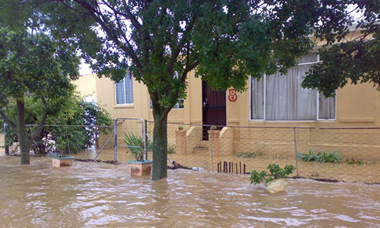 A flood occurs when there is a rise in the water level in a specific area until there is too much water for that area to absorb. Floods can be caused by too much rain, blocked rivers and streams, weakened dam walls or storm surges (waves driven ashore by strong winds).
A flood occurs when there is a rise in the water level in a specific area until there is too much water for that area to absorb. Floods can be caused by too much rain, blocked rivers and streams, weakened dam walls or storm surges (waves driven ashore by strong winds).
There's often no way to prevent a flood, but there are many ways to keep safe and ensure that you and your family are safe. Floods are usually caused by storms that bring heavy rain and can cause serious damage once the water accumulates on land and enters homes and other buildings. People living in low-lying areas are most affected. Other possible causes include:
- poor drainage,
- seeping; caused by water rising through cracks,
- rise of water levels in seas, rivers, canals and dams, and
- leaking in old or poorly built structures.
How can I prepare for a flood?
- Have a first aid kit and include all necessary medication.
- Save emergency numbers on your cellphone.
-
Teach your children to memorise your phone number in the correct order.
-
Keep all your personal documents, credit cards and medical aid details in a waterproof bag.
-
Pack dry clothing to keep warm.
-
Have an emergency whistle to signal for help.
-
Pack non-perishable foods, candles, water and matches.
-
Safeguard your home by fixing cracks, pipes and clearing gutters.
-
Raise your appliances off the ground.
-
Seal your walls and open spaces, by adding other materials to keep the water out.
-
Have a torch, battery radio and spare batteries.
-
Switch off all electrical appliances.
-
Tie down all moveable objects outside of your home.
-
Keep animals indoors with you.
Have an emergency plan
Don't be caught off-guard. Discuss an emergency plan with your family and work out an escape route in case there's a flood near or in your home and make sure you know the emergency numbers you might need.
What should I do during a flood?
- Monitor current flood warnings. Listen to the radio for emergency warnings, evacuation advice and weather updates.
- Avoid entering floodwater unless it is necessary, and never underestimate the strength of floodwater, even if you are inside a vehicle.
- Follow all instructions from emergency authorities.
- Turn off all electricity and water and take your cellphone with you.
- Assist elderly and disabled neighbours.
What should I do after the flood?
- Before entering your house, wait until the water has dropped below floor level.
- Check with electricity and water authorities to know whether it is safe for you to use these resources.
- Be aware of contamination if water sources have been flooded; this could be unsafe to drink.
You can lessen flood and landslide risk by:
- Checking that your drain on your property is in good working order.
- Removing all dead and burnt trees that could fall onto the property.
- Placing sandbags where necessary to protect vital areas.
- Raising the floor level of your house to be higher than the land outside.
- Listening to weather warnings that are issued by the South African Weather Service.
- Checking the terms of your insurance policy concerning flood and mud damage.
- Advising you neighbour that his boundary wall is diverting water and mud onto your property and bring it to his attention that it is illegal to divert water and mud to another's property.
If there is a risk of a flood or mud flowing to your property, use a different path through the property that will cause the least damage (such as a pathway or stairs) and use sandbags to try and confine the flow to that route.

 A flood occurs when there is a rise in the water level in a specific area until there is too much water for that area to absorb. Floods can be caused by too much rain, blocked rivers and streams, weakened dam walls or storm surges (waves driven ashore by strong winds).
A flood occurs when there is a rise in the water level in a specific area until there is too much water for that area to absorb. Floods can be caused by too much rain, blocked rivers and streams, weakened dam walls or storm surges (waves driven ashore by strong winds).
